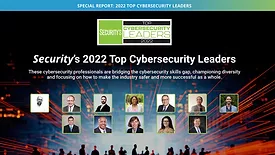Home » Women in Security
Articles Tagged with ''Women in Security''
Special Report / Women in Security 2022
Kimberly Cheatle, Senior Director – Global Security at PepsiCo, thrives on helping to protect and support others.
Read More
Special Report / Women in Security 2022
Women in Security 2022: Medha Bhalodkar, Columbia University
Medha Bhalodkar, Columbia University’s first CISO, has built a cybersecurity and IT risk management program focused on unification.
July 1, 2022
Special Report / Women in Security 2022
Women in Security 2022: Theresa Bentch, Garmin International
As Director of Security, Environmental Health & Safety and IT Risk Assurance, Theresa Bentch wants to create long-lasting and impactful security programs, helping her teams realize their potential.
July 1, 2022
Special Report / Women in Security 2022
Security’s 2022 Women in Security
These professionals represent the depth, breadth and diversity that make up women across all functions, roles and responsibilities within the security industry.
July 1, 2022
Special Report
Security’s 2022 Top Cybersecurity Leaders
These cybersecurity professionals are bridging the cybersecurity skills gap, championing diversity and focusing on how to make the industry safer and more successful as a whole.
March 1, 2022
Sign-up to receive top management & result-driven techniques in the industry.
Join over 20,000+ industry leaders who receive our premium content.
SIGN UP TODAY!Copyright ©2026. All Rights Reserved BNP Media.
Design, CMS, Hosting & Web Development :: ePublishing





.webp?height=168&t=1652795449&width=275)




